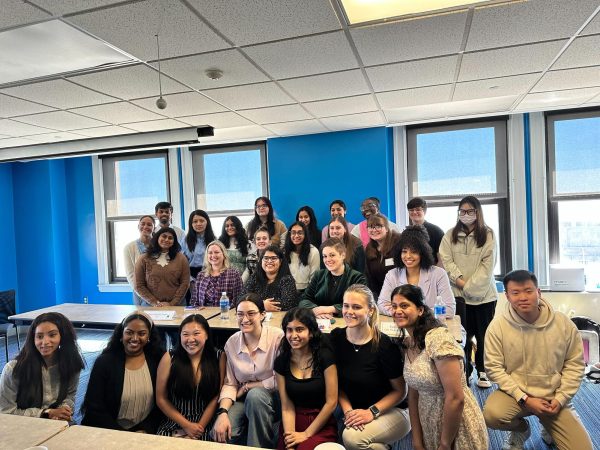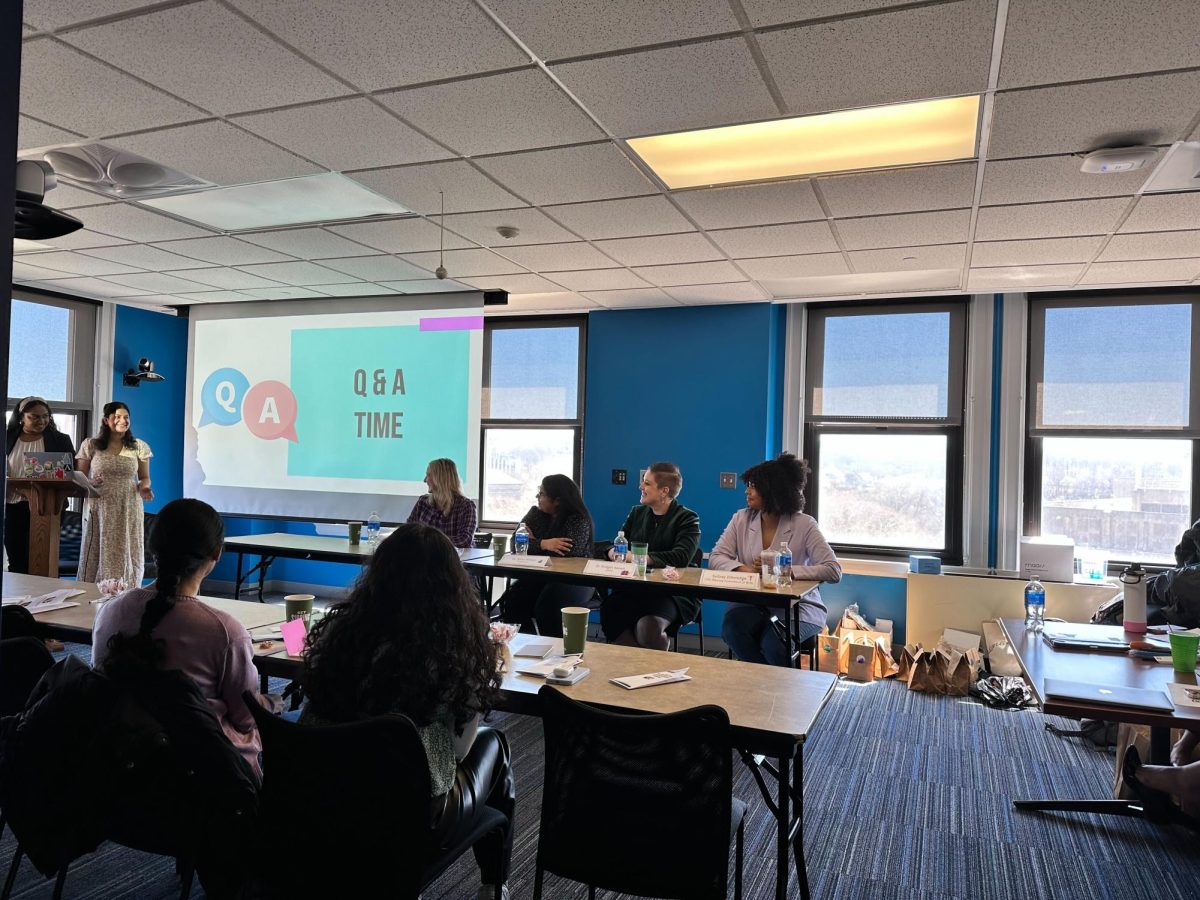Girl Up at Pitt hosted its third annual Women in Leadership Panel on Sunday to “empower” women and keep students motivated, according to Girl Up Events Chair Bailey Kielinski.
“By the end of spring semester, I always feel kind of burnt out going into finals, and having different events like these reminds me, ‘okay, there’s a purpose,’ there’s a method to the madness, and all this hard work that we do is gonna pay off,” Kielinski, a junior psychology major, said.
This spring’s panel featured four female leaders from a range of different backgrounds — Dr. Bridget Keown, a gender, sexuality and women’s studies associate professor; Kiran Nihlani, an undergraduate adviser and statistics associate professor; Nicola Foote, the dean of Frederick Honors College and graduate professor and Sydney Etheredge, CEO of Planned Parenthood of Western Pennsylvania. The women spoke in room 630 of the William Pitt Union on Sunday morning while co-presidents Neeraja Sundara and Praditha Behara moderated the discussion.
“As an e-board, we are trying to target different majors and different professional settings,” Kielinski said. “I personally [suggested] we ask Dr. Kiran Nihlani. She was my statistics professor, and I remember always really appreciating having a female professor in the STEM field.”
The panelists covered a wide range of topics surrounding being a woman in the workplace, especially in male-dominated fields. Despite women possibly feeling intimidated by STEM fields, Keown told the crowd that their “voice is so critical to the future of the field.”
“I know it’s probably not helpful to hear right this very second, but you not only deserve to be there — the field itself needs you to be there,” Keown said. “Off the top of my head, we know that white men are the predominant users for AI. As a result of that, AI is really misogynist and tends to really enhance a lot of racial biases and gender biases and sex biases and all of these things. And that’s not going to change if the exact same people are having the exact same conversation.”
Nihlani highlighted how she has experience as the “sole person in a lot of STEM classes.” And now as an instructor, Nihlani said she continues to see “that 70-30 division” of male-to-female students, but added that women need to feel confident in themselves and their belonging in STEM fields.
“You need to believe in yourself, that your role counts,” Nihlani said. “You have a good community around you, but you also need to talk yourself up. It helps to be a little cocky … you belong, you show up, you make yourself heard, and eventually, you are part of the bigger change.”

The crowd of attendees at the panel consisted mostly of female college students, but a handful of men also attended. Foote highlighted the importance of men getting involved in fixing the professional gender imbalance.
“Thank you for being here,” Foote said. “And I think you have a role too, right? If you’re in these STEM classes and you’re the 70%, really make sure you bring women into the groups … If you see men dominating the group work or discussion, you communicate that you don’t find that acceptable.”
One of the attendees asked the panelists how they “make compromises in their career.” Nihlani brought up the negative connotation that comes with the word “compromise” and that “if you have that negative connotation, it will have baggage.”
“I feel like you have to break away from those negative and positive associations of words,” Nihlani said. “I feel like, any time you make a decision, it’s situational, it’s conditional. You have a lot of things going on. So, I say it’s a conscious decision, or an informed decision … If you made a compromise, it was needed at the moment.”
Nihlani also highlighted how many “negative connotations come from cultural things.” She urged the attendees to build their own paths, regardless of societal norms.
“Being a female, being a mother, being a wife has meant something to a lot of people. It will look different in your case,” Nihlani said. “You have to understand what you want to do. There is not one path to it. If you’re stopping yourself right now, you also have to know that you can come back. It may be a different path, it may look different, but ultimately it’s where you are at the end that’s important.”
Kruti Karnik, a junior computational biology major, attended the panel because she had Nihlani as a professor, but wanted to hear Etheredge’s perspective since she is also interested in the healthcare field.
“It was so inspiring, especially to hear their struggles and how they overcame them,” Karnik said. “And how that can reflect on my path, going through undergrad and trying to make those decisions of what I want to do … I feel like this really helped support me in some way and made me feel more comfortable in my position and my career.”
Karnik left the panel feeling “reassured” in her power to choose her own path. She felt inspired by Nihlani’s stance on compromise and her message that “growth happens outside your comfort zone,” along with Etheredge’s advice on being a leader.
“Being a leader is about having your boundaries and communicating that,” Karnik said. “As long as you know what you want to do, you don’t have to explain it to everyone. I feel like that was really reassuring to hear. Just, like, do whatever makes you feel comfortable in life — don’t do it based on what other people expect of you.”
Kielinski left the event “feeling inspired on a Sunday morning.”
“Regardless of whether you’re in STEM or not, you have a purpose, and I think it’s really important that leadership looks different for everyone,” Kielinski said. “Just do what you’re comfortable and happy with, don’t let society dictate your path.”


